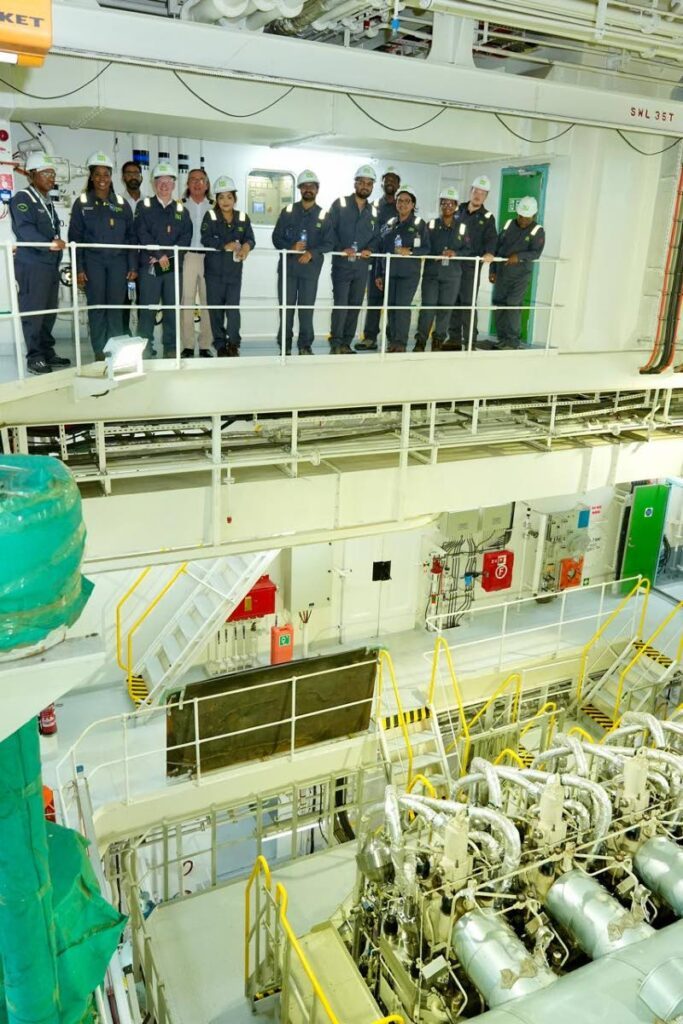Proman: Trinidad and Tobago has potential to be methanol bunkering hub

PROMAN, one of the world's largest methanol producers, on August 16 said there is potential for Trinidad and Tobago to be a methanol bunkering hub.
Speaking with reporters after a tour of the company's plants and the methanol-powered ship Stena Prosperous in Point Lisas, the Swiss company's global shipping director, Matthias Classen said the country's strategic location works in favour of the hub.
The Stena Prosperous refuelled in Point Lisas on August 16 and the vessel's sister Stena Pro Patria is expected to do the same in the coming days.
"You have the Gulf of Paria, which... usually really has good weather and a smooth sea, which you need for bunkering operations. And it's right on the main trade line. So in between South America and the US, which is a major trade line. Also, ships going from South America to Asia, they're literally passing Trinidad. So the deviation to go east of Trinidad or west of Trinidad is minor. It's not even really deviation. So it's a very attractive location."
Director of marketing and logistics Hanna Sukhu-Maharaj added: "And of course, we're within three or four days away from the Panama Canal which is probably the most utilised canal globally."
"So when you think about where we're positioned, it's really ideal for our country."
An August 16 news release said, methanol is widely available at over 120 ports globally, including Point Lisas. It said the local port is being used regularly to refuel ships having supplied 12,500 (MT) metric tonnes of its locally-made methanol so far for 2024 with 2,100 MT in August alone.
Citing data from DNV, a classification society and recognised advisor for the maritime industry, Proman said 300 methanol-fuelled vessels are expected on the water by 2027 (not including bunker barges or retrofits) and over 70 have been ordered so far in 2024 alone.
Managing director of operations Aleeya Ali said this also underscored the scope of the available market.
“The huge increase in orders for methanol-fuelled ships, and our regular refuelling here in Trinidad, shows the viability of methanol as a marine fuel and the potential of Point Lisas and Trinidad as a bunkering hub. We are proud to not only export Trinidad-produced methanol, which supports jobs, the local economy and our communities, but to also put Trinidad on the map as a hub for cleaner, alternative marine fuels.”
Apart from its potential to bring Trinidad into the spotlight, Proman said when used as a maritime fuel, methanol can see reductions in greenhouse gases spewed into the environment.
"When used as a marine fuel, all forms of methanol virtually eliminate particulate matter and sulphur oxides and cut nitrogen oxides by up to 80 per cent during combustion, compared with petroleum-based fuels."
Journalists weren't allowed to quote officials during the tour and, according to Proman, were barred by the Port Authority from carrying recording devices into the docked vessel but while on the Stena Prosperous, the immaculately clean engine room was highlighted as evidence of the reduced emissions of methanol fuel.
To further highlight this point, Proman said the vessel departed Singapore in May, and stopped in Indonesia, Brazil and the US before arriving in Trinidad. But using methanol, carbon dioxide emissions were 31 per cent less than what would have been created for the voyage had it used traditional very low sulpher fuel oil.
The 49,400 dead weight tonnes Stena Prosperous is one of six methanol-fuelled tankers commissioned by Proman and Stena Bulk in 2019 and delivered between 2022 and January, 2024. It has 18 cargo tanks and consumes 40 to 60 MT per day.
Proman is one of the world's largest methanol producers. It has the capacity to produce 4 million MT of methanol annually. Of its 17 petrochemical plants globally, 14 are located in Trinidad. It employs over 2,000 employees with the majority (at least 1,100) in Trinidad.
The company said it has contributed US$11 billion to Trinidad and Tobago's economy, US$8.4 million in corporate social responsibility investments in communities between 2014 and 2023 and US$5.1 billion in capital investments.

Comments
"Proman: Trinidad and Tobago has potential to be methanol bunkering hub"